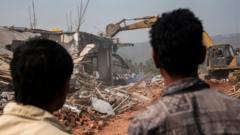The recent ruling by India's Supreme Court prohibiting "bulldozer justice" has left many victims, including Afreen Fatima, grappling with their past losses in a system that fails to provide reparations. While the court's decision aims to prevent arbitrary demolitions, it leaves the question of compensation for those already affected unresolved.
Supreme Court's Landmark Decision Against "Bulldozer Justice" Raises Questions of Compensation

Supreme Court's Landmark Decision Against "Bulldozer Justice" Raises Questions of Compensation
As India bans the controversial demolition practices linked to crime punishments, victims like Afreen Fatima seek justice for their lost homes.
In a significant ruling, India's Supreme Court has officially outlawed the practice commonly termed "bulldozer justice," a method where authorities demolish individuals' homes ostensibly as punishment for alleged crimes. This controversial phenomenon gained notoriety following series of demolitions that were seen as targeting Muslim communities in response to protests or supposed illegal activities, particularly under the governance of the Bharatiya Janata Party (BJP).
One prominent case is that of Afreen Fatima, an activist from Prayagraj. In 2022, her family’s home was bulldozed after her father, local politician Javed Mohammad, was arrested and named a "key conspirator" in a protest that turned violent. Despite his denial of the accusations and lack of a criminal conviction, the action against the family's home exemplified the swift punitive measures taken against those accused of wrongdoing.
The Supreme Court's recent decision did bring a moment of hope for many, including Fatima. The judgment mandates that authorities cannot demonstate individuals before proving their guilt and requires advance notice of demolitions, promising accountability for officials who err in this process. However, while the ruling is seen as a crucial step forward by many, it doesn't address the pressing need for redress for families like Fatima's that have already suffered extensive losses.
With emotional ties to their former houses severed, victims like Ms. Fatima reflect on their displaced statuses. No form of reparations or initiatives to rebuild lives was mentioned in the court's orders, leaving numerous families in a perpetual state of uncertainty and loss. Legal experts believe that while considerations for future demolitions are more clearly delineated, the past remains overshadowed by unresolved anguish and a lack of systemic support.
Amid discussions on territory and justice, the reality of many affected individuals highlights the broad chasm between policy change and meaningful restitution. For families still reeling from the emotional and financial fallout of bulldozer justice, the court's ruling, while historic, does little more than illuminate their plight without delivering the tangible support they need to rebuild their lives.




















